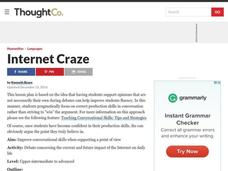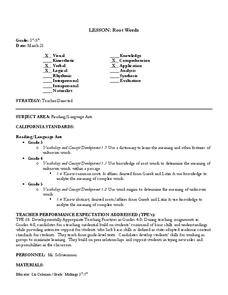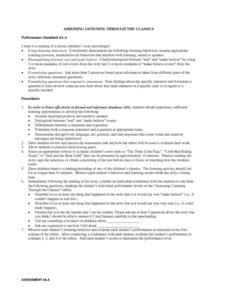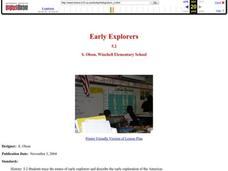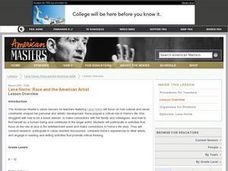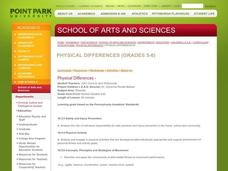Curated OER
Tackling a Statement: Rights of the Child
Learnersare introduced to the idea that people have rights. They voice opinions about whether children should have special rights and be treated differently then adults. The main purpose of the activity is to get students thinking and...
Curated OER
Nervous System
Get to know the body's central nervous system through an engaging game of nervous system telephone. But this isn't your average game of telephone. Here, pupils must find a way to communicate a message to the brain without speaking....
Curated OER
Conversation Lesson: Internet Craze
Learning to support your opinions, debate, build arguments, and effectively respect another's point of view are vital skills. Learners work through a series of topics to practice discussion engagement and verbal communication.
Haut Gap Middle School
Root Words
Scholars demonstrate their knowledge of root words aqua and aud, and develop vocabulary skills by completing of a chart, handout, and worksheet using creative thinking skills, a dictionary, and a thesaurus.
Curated OER
K-W-L Chart
After choosing a topic of interest, young learners use the K-W-L thinking process to create an informational, illustrated, big book. K-W-L, a three-part thinking process, asks the learner to respond to three questions: What do we know...
Curated OER
Can You See What I See?
Young scholars gain an understanding of the methods used to explore the earth's surface. Students create a time line leading to the first satellite image of the Earth that includes the various methods utilized to observe the earth's...
Curated OER
I Am Special and You Are Special Too #3
Students explore the meaning of unique and special. They study about why a birthday is significant. They investigate how families celebrate birthdays in different ways and they reflect on why growing up is a good thing.
Curated OER
Colonial North Carolina
Eighth graders are introduced to the conditions of North Carolina when it was still a colony. Using the internet, they research the political, religious and economic problems the colony faced and how they dealt with them. They also...
Curated OER
Mapping Perceptions of China
Young scholars discuss what types of things are included on a map. They compare and contrast maps of China with a map they create and practice using different types of maps. They write analysis of their classmates maps.
Curated OER
Connecting the Dots: Workers and Their Importance
Young scholars explore the role of workers and their jobs in the community. They write a friendly letter to a community worker expressing appreciation for the work they do and their importance to the community.
Curated OER
ASSESSING LISTENING THROUGH THE CLASSICS
Students demonstrate listening behaviors. They assume appropriate listening position, minimize/avoid behaviors that interfere with listening, and attend to speaker. They distinguish between real and make believe and cite 2 or more...
Curated OER
Making Recycled Paper
Students explore the advantages of recycling paper. In this environmental lesson plan, students produce recycled paper by ripping up paper and putting it into a blender with water to create a mixture. Students use their recycled paper to...
Curated OER
Conventions: Verbs
Fifth graders study verbs. For this grammar lesson, 5th graders access the web site known as www.wideworldofverbs.com reviewing the verbs in each sentence and write five sentences using the correct usage of verbs.
Curated OER
Solid, Liquid or Gas?
Students explore solid, liquids, and gases. In this science lesson plan, students distinguish similarities and differences of matter and recognize that different states of matter may appear in one substance.
Curated OER
You've Got Mail
First graders study the postal system and letter writing. They exchange class letters with another class in a different area and become pen pals with residents in a local nursing home.
Curated OER
Greetings and Introductions
Students recite common forms of courtesy, greetings and leave takings appropriate to the time of day. They practice identiying the differences in forms of address for age and rank. Pupils are each given a copy of the "Greetings and...
Curated OER
Problem Solving Process: One-To-One Correspondence
First graders observe and demonstrate a variety of problem solving strategies to solve problems involving one-to-one correspondence and whole numbers to 100. They discuss the steps of the problem solving process, and solve a word...
Curated OER
Early Explorers
Fifth graders give a presentation about one of the explorers. In this explorers lesson, 5th graders research an explorer and give a presentation to the class. While students are presenting the others are taking notes on a graphic organizer.
Curated OER
Clouds
Second graders explain what a cloud is, how it is formed and what the various types of clouds are. They do an experiment which shows them how to "make" a cloud, and write in their science journals about a "crazy weather day."
Curated OER
Lena Horne: Race and the American Artist
Students examine how race played a critical role in Lena Horne's life. They conduct Internet research, participate in a class debate, write a letter, and create a presentation based on their Internet research.
Curated OER
MONSTERS AND MYTHS: SCRIPTS /SCULPTS
Seventh graders are introduced to myths formed by many cultures as a unique genre of literature. They use critical thinking skills to compare and contrast mythic tales, compare versions of the same story, and respond to literature in...
Curated OER
Life Processes
Students identify life processes and create their own creature. In this creative science lesson, students identify an organism's life processes and categorize them into groups. They then create their own creature and write about how it...
Curated OER
Diversity
Students access prior knowledge of the five senses and relate to students with disabilities. In this people with disabilities lesson, students research and use a Venn diagram to compare and contrast famous people and their...
Curated OER
A Peaceful Place Is Powerful for the Mind
Fourth graders explore, analyze and interpret how schools can become peaceful places to learn and interact with others. They study a wide variety of avenues to achieve this task through classroom, community and career activities...


